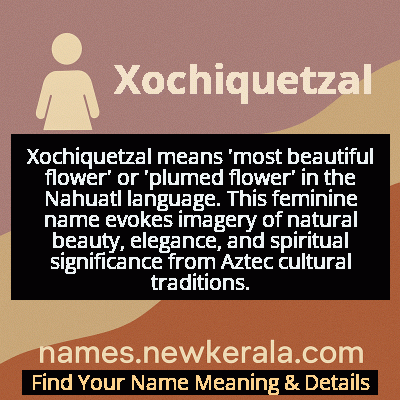Xochiquetzal Name Meaning & Details
Origin, Popularity, Numerology Analysis & Name Meaning of Xochiquetzal
Discover the origin, meaning, and cultural significance of the name XOCHIQUETZAL. Delve into its historical roots and explore the lasting impact it has had on communities and traditions.
Name
Xochiquetzal
Gender
Female
Origin
Nahuatl
Lucky Number
8
Meaning of the Name - Xochiquetzal
Xochiquetzal means 'most beautiful flower' or 'plumed flower' in the Nahuatl language. This feminine name evokes imagery of natural beauty, elegance, and spiritual significance from Aztec cultural traditions.
Xochiquetzal - Complete Numerology Analysis
Your Numerology Number
Based on Pythagorean Numerology System
Ruling Planet
Saturn
Positive Nature
Ambitious, efficient, realistic, and authoritative.
Negative Traits
Materialistic, stressed, confrontational, and can be overly ambitious.
Lucky Colours
Dark blue, black.
Lucky Days
Saturday.
Lucky Stones
Blue sapphire, amethyst.
Harmony Numbers
2, 4, 6.
Best Suited Professions
Business leaders, managers, financial services, law enforcement.
What People Like About You
Leadership, determination, organizational skills.
Famous People Named Xochiquetzal
Xochiquetzal Flores
Contemporary Artist
Known for vibrant floral installations that blend indigenous Mexican traditions with modern art forms
Xochiquetzal Candelaria
Poet and Educator
Award-winning poet whose work explores themes of cultural identity and feminine power
Xochiquetzal Miranda
Cultural Anthropologist
Leading researcher in Mesoamerican spiritual traditions and women's roles in indigenous societies
Name Variations & International Equivalents
Click on blue names to explore their detailed meanings. Gray names with will be available soon.
Cultural & Historical Significance
As one of the few Aztec deities not requiring human sacrifice, she was celebrated through dance, poetry, and floral offerings, embodying the more gentle aspects of Mesoamerican spirituality. Her cultural significance extends beyond ancient times, as she has become a symbol of indigenous feminine power and cultural resistance in contemporary Latin American movements. Modern interpretations often highlight her as a figure of artistic inspiration and ecological awareness, connecting ancient reverence for nature with contemporary environmental concerns.
Extended Personality Analysis
Individuals named Xochiquetzal are often perceived as creative, passionate, and deeply connected to beauty and nature. They tend to possess a strong artistic sensibility, whether expressed through visual arts, music, writing, or other creative outlets. Their personality typically combines sensitivity with strength, reflecting the dual nature of their namesake goddess who represented both delicate beauty and powerful feminine energy.
Xochiquetzal-named individuals often exhibit natural charm and social grace, with an ability to bring people together through their warmth and creativity. They are frequently drawn to helping professions or artistic careers where they can express their innate sense of aesthetics and compassion. While they may appear gentle, they usually possess inner resilience and determination, particularly when defending their values or protecting those they care about. Their connection to their namesake often gives them a strong sense of cultural identity and appreciation for tradition.
Modern Usage & Popularity
In contemporary times, Xochiquetzal has seen a resurgence as parents seek meaningful indigenous names that celebrate cultural heritage. While still relatively rare, its usage has grown significantly in Mexican-American communities and among families interested in reconnecting with pre-Columbian traditions. The name appears most frequently in artistic and academic circles, where its cultural significance is particularly valued. Modern bearers often go by nicknames like 'Xochi' or 'Quetza' for daily use. The name's complexity and distinctive sound make it memorable, though some parents opt for simplified spellings. Its usage reflects a broader trend of reclaiming indigenous names as symbols of cultural pride and resistance to historical erasure, particularly in diasporic communities seeking to maintain cultural connections.
Symbolic & Spiritual Meanings
Xochiquetzal symbolizes the interconnectedness of beauty, creativity, and feminine power in the natural world. The 'plumed flower' imagery represents the union of earthly beauty (flowers) and spiritual elevation (feathers), suggesting a being who bridges different realms of existence. Symbolically, she embodies the idea that true beauty contains both delicate and powerful elements, much like flowers that are both fragile and resilient. Her association with artists and craftspeople makes her a patron of human creativity and the transformative power of art. The flower symbolism extends to represent growth, blooming potential, and the cyclical nature of life, while her connection to fertility encompasses both biological and creative fruitfulness, making her a multifaceted symbol of generative power in all its forms.

